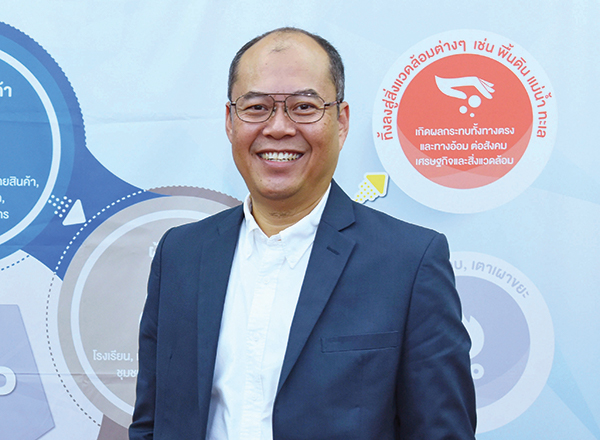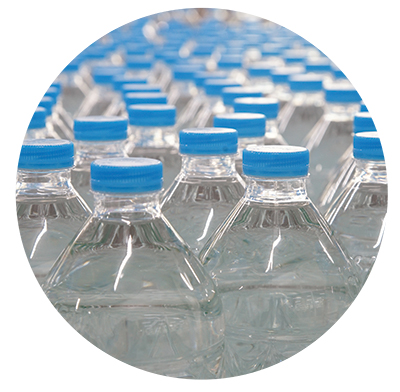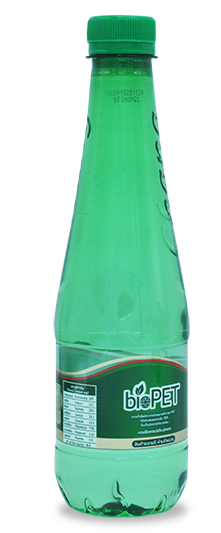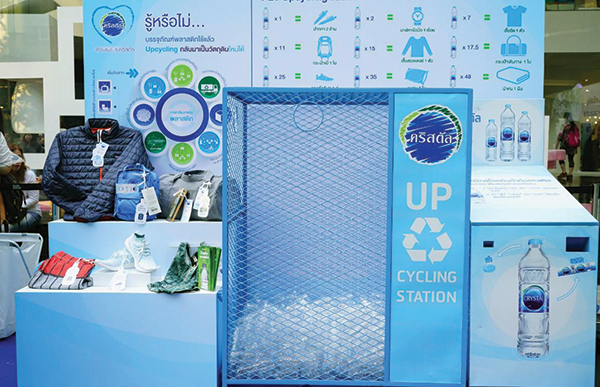 | GRI305-5 |
- Glass, paper, aluminium, and plastic are the main packaging materials used in producing spirits, beer, non-alcoholic beverages and food.
- When developing packaging, ThaiBev considers environmental factors by using the 3Rs principle, Reduce, Reuse and Recycle, to reduce long-term impacts on the environment and society.
- ThaiBev has collaborated with public and private sectors, as well as local communities, in many projects and activities to promote cooperation to tackle packaging waste and pollution.
INSIGHT
 |
Sinchai Thiensiri
|
The various kinds of used packaging are raw materials. If we separate packaging after consumption, the packaging can be used as a raw material in production.
Both the public and private sectors must take part in encouraging consumers to be aware and take responsibility for the results of their own consumption, and to increase channels for consumers to have a role in adjusting their behavior to promote a society of sustainable consumption at the national level.
| STORY | Management of the Main Packaging Materials |
- Reduce the weight of single-use bottles and recycle them in the production process
- Redesign the shape to be impact-resistant, in order to be reused as many times as possible
- Start a business to buy leftover glass directly from consumers so that waste can be used as raw materials in production
Reduce
Reduce the use of raw materials
(sand) by
43,680 tons
in the bottle manufacturing process
Reuse
Cullet recycled in production
processes totalling
108,256 tons
Recycle
1,490 million
glass bottles reused
in the production process
- Increase the proportion of recycled paper and use damaged cartons to make compressed paper blocks for reuse in the production of corrugated cartons
- Use technology to help reduce the amount of paper used while maintaining quality and durability
- Encourage consumers to collect used corrugated cartons in exchange for money
Reduce
Reduce the use of paper resources
by an average of
7% per unit
in the production of
corrugated cartons
Reuse
78%
rate of recycled content per unit
100%
of corrugated cartons used in spirits
and beer businesses contain
recycled paper
Recycle
Over 10 million
corrugated cartons and partitions
retrieved and reused
- Stop using plastic bottle cap seals
- Increase the proportion of bio-based materials in mineral water bottles
- Change to biodegradable plastic bags for food

> 340 million
pieces of plastic reduced from banning cap seals, estimated at
65 %
of total plastic bottles produced
30 %
of materials used in plastic bottles is derived from plant sources
Time for biodegradable
plastic bags to degrade
3 years on average
150
times less
than normal plastic bags

>340 million
pieces of plastic reduced

30%
of plastic component is derived from plants

2,400
tons of glass retrieved

Recycling center

Transported to mainland by trucks and vessels

Used glass bottle and cullet collection center


60
Upcycling stations

60 tons
of plastic retrieved
 Students collect
plastic bottles
Students collect
plastic bottles
 Upcyling station
Upcyling station
 Sorting
Sorting
 Manufactured
into other products
Manufactured
into other products
 Products from
used plastic bottles
Products from
used plastic bottles

17 g
In the beginning

15.5 g
2014

14.6 g
2016

13.5 g
2017

12.7 g
Next step

Reduced amount of main packaging waste by

Reduced GHG emissions by

Glass

Paper

Plastic
Target
80%
of main packaging materials are reused,
recycled and retrieved by 2020
ThaiBev has set a long-term target in order to achieve sustainable packaging management, considering the impact of products from design and development all the way to post-consumption management.
Take into account the packaging’s end-of-life, including the retrieval process, whether for reuse or recycling
- Incorporate environmental considerations into packaging material selection, such as the use of recycled material
- Collaborate with partners in creating packaging innovations in order to minimize long-term environmental impacts
Use technology to improve packaging production in order to increase resource efficiency, for instance, reducing the amount of waste from the production process
- Establish purchasing centers in every region of Thailand to retrieve used packaging as well as scraps, including glass bottles, cullet, and corrugated cartons
- Set targets to reuse packaging in packing and production processes
- Encourage consumers and local communities to take part in post-consumption packaging management













